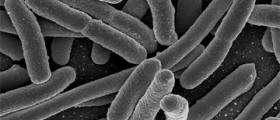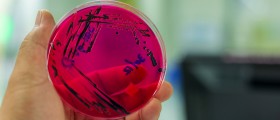
An Overview of E. coli
E. coli is a group of gram-negative bacteria which are commonly found in the intestines, but have toxic effects on the human or animal body under certain circumstances.
E. coli infections are usually easily treatable, but they can sometimes lead to serious health consequences, especially in children, the elderly, and chronically ill individuals.
In some rare cases, E. coli infections can lead to renal failure, anemia, and dehydration. Patients usually need to be hospitalized in the most extreme cases of infections. Other organs are known to fail due to a large number E. coli bacteria.
Mental changes have been observed in elderly people suffering from E. Coli infections, and so has spontaneous bleeding.
In most cases E. coli infections do not leave any serious health consequences and are easily treatable. It should be noted that once the E. coli bacteria start to multiply out of control they could cause recurring infections. A course or two of antibiotics can temporarily solve the problem but it is not uncommon to be battling the same infection over and over again, especially in the urinary tract when it comes to women. Depending on the strain of E. coli bacteria there are vaccines that individuals could take to stop the E. coli from coming back.
E. coli Infection In The Body
E. coli normally colonize the intestines in both humans and animals, where they assist with digesting of foods. In fact, you may be surprised to hear that up to 70 percent of the bacteria found in our intestinal tracts are E. Coli.
E. coli create infections in the body when the bacteria start to multiply out of control as a result of a compromised immune system. The bacteria usually lead to infections in the urinary tract, bladder, and kidneys but can sometimes get into the blood stream and travel to other parts of the body. Individuals with E. coli infections exhibit symptoms like abdominal cramps, vomiting, and bloody diarrhea.
Foods That Could Contain E. coli
Other than the host bacteria multiplying in the body, strains of E. coli can be ingested through different types of foods, causing food poisoning.
There have been cases of E. coli found in green leafy green veggies such as spinach, or in beef. Undercooked hamburgers made at home or bought at a restaurant are known to contain plenty of bacteria tha can create serious E. Coli infections. Veggies that come from farms where the water was contaminated with bacteria are also dangerous.
It is advised always to purchase fresh produce from authorized and safe markets. Also, fruit juice that is not pasteurized is full of germs that could leave serious health consequences.
In order to avoid ingesting contaminated foods, experts recommend thoroughly cooking all types of meat, especially ground meat. Vegetables such as lettuce, onions, and and cucumber, should be washed and scrubbed before consumption, and only pasteurized juices should be chosen.
It is very important that adults take special precautions when preparing meals for children. Cooking and washing foods thoroughly prevents infections, both in the case of E. Coli and other microorganisms, and so does keeping the overall hygiene in the kitchen to good standards.
Adults should teach children to order only well done burgers when eating out and to be extra careful not to swallow any pool or lake water when swimming. Also, washing hands every time they use the bathroom and before each meal is one of crucial steps in preventing E. coli infections in children.
How Does Our Blood React to E. coli?
There are some instances in which a strain of E. coli gets into the blood, either through an open wound or the use of an IV line or catheter in hospital settings. When E. Coli bacteria enter the blood stream, it causes blood poisoning, which is also known as septicemia or, in a more severe form, sepsis.
Some of the most common signs and symptoms of sepsis include an elevated heart rate, a very high body temperature (high fever), abnormally high respiratory rate, and abnormally high or low amount of white blood cells. In order to diagnose sepsis the doctor will ask for a blood culture test to isolate the infectious agents.
The patient needs to be exhibiting at least 2 of the symptoms and meet the lab criteria from the blood test for sepsis in order to be diagnosed. Other very prominent symptoms of sepsis are used for diagnosing purposes, such as little or no urine and altered mental state. Very low blood pressure is another sign of sepsis that can be used for diagnosing purposes.
Because sepsis can lead to septic shock, and in turn coma and death, it is vital that blood poisoning is diagnosed and treated rapidly.
Diagnosing E. coli Infections
In cases in which the symptoms of E. coli infection last for more than a few days, it is advised that the affected individual seeks immediate medical attention. The patient's primary health care provider will run a couple of basic tests, such as a blood, urine, and stool test, to determine the presence of bacteria.
In most cases, urine and stool samples are sent for a culture test where it is determined which antibiotics are the most effective in fighting the specific strain of the bacteria. Most people need antibiotics in order to fight E. coli. The majority of infected individuals recover at home after a couple weeks, but there are some instances in which patients need to be placed under hospital care. One of the most dangerous consequences of E. coli poisoning is kidney failure.
- www.cdc.gov/ecoli/qa_ecoli_sickness.htm
- www.cdc.gov/ecoli/general/index.html
- Photo courtesy of Umberto Salvagnin by Flickr: www.flickr.com/photos/34745138@N00/2072160194/

















Your thoughts on this
Loading...